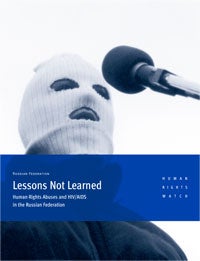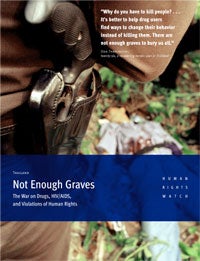 |
 |
 |
 |
"Lessons Not Learned: Human Rights Abuses and HIV/AIDS in the Russian Federation" April 2004 The Russian Federation faces a deadly AIDS epidemic that is being driven by human rights abuses of the more than 1 million Russians living with HIV/AIDS and whose marginalized status puts them at high risk of the disease. Though injection drug use is the primary cause of HIV transmission in Russia, the Russian government has done little to support measures that would prevent the spread of HIV by these means. The government has permitted police to disrupt syringe exchange programs and it bans outright the use of methadone to treat opiate addiction – measures that have been proven central to effective HIV prevention. Harsh penalties for small-scale drug possession has landed many drug users in jail, and the absence of HIV prevention services in prisons (and elsewhere) has spelled a death sentence for many of these people. Yet rather than learning from the experiences of countries with more mature HIV/AIDS programs, Russia has systematically rejected well-established lessons of fighting AIDS. It has also done little to combat common stigma and ignorance related to HIV infection, including the misperception that HIV can be spread through casual contact. To prevent the further spread of this growing epidemic, the Russian government must act to combat ignorance and abuse “The doctor told me that they would rather give treatment [for HIV/AIDS] to me than to my sister who still uses drugs. They told my sister ‘you’re not worth it—sooner or later you’ll just wind up in prison.’” |
 |
'Not Enough Graves: The War on Drugs, HIV/AIDS, and Violations of Human Rights in Thailand" Thailand: July 2004 A violent anti-drug crackdown has severely tarnished Thailand’s human rights record and undermined its fight against HIV/AIDS. In a three-month period that began on February 1, 2003, Thailand’s “war on drugs” led to the shooting deaths of more than 2,000 people in apparent extrajudicial executions, as the government placed thousands of suspected drug offenders on blacklists and referred to them as the “scum of society.” The government blamed most of these killings on violence among drug traffickers, and in August 2003, Thai Prime Minister Thaksin Shinawatra instituted a shoot-to-kill policy against anyone suspected of smuggling drugs from neighboring Burma. Atrocious in their own right, these killings – and the state-sponsored campaign of fear that accompanied them – have driven scores of injection drug users into hiding, placing them at high risk of HIV infection from the sharing of blood-contaminated syringes. With HIV rates soaring above 40 percent among heroin users, the Thai government must halt its illegal and inexcusable counternarcotics practices if it wishes to curb its raging HIV/AIDS epidemic. “They will be put behind bars or even vanish without a trace. Who cares? They are destroying our country.” |
